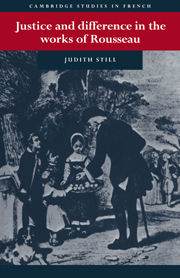Book contents
- Frontmatter
- Contents
- Acknowledgements
- A preliminary note on vocabulary and conventions
- Introduction
- Chapter 1 The problem: the intersection of beneficence and pudicity
- Chapter 2 The code of beneficence
- Chapter 3 The practice of beneficence and model benefactors in the major works
- Chapter 4 The passion of pity in Rousseau's theory of man
- Chapter 5 Gyges' ring: a reading of Rousseau's 6e Promenade
- Chapter 6 Pudicity in some of Rousseau's minor writings: its relationship to beneficence
- Conclusion
- Appendix: Generosity and pudicity in Gyges und sein Ring and Le Roi Candaule
- Notes
- Bibliography
- Index
- Cambridge Studies in French
Chapter 6 - Pudicity in some of Rousseau's minor writings: its relationship to beneficence
Published online by Cambridge University Press: 22 September 2009
- Frontmatter
- Contents
- Acknowledgements
- A preliminary note on vocabulary and conventions
- Introduction
- Chapter 1 The problem: the intersection of beneficence and pudicity
- Chapter 2 The code of beneficence
- Chapter 3 The practice of beneficence and model benefactors in the major works
- Chapter 4 The passion of pity in Rousseau's theory of man
- Chapter 5 Gyges' ring: a reading of Rousseau's 6e Promenade
- Chapter 6 Pudicity in some of Rousseau's minor writings: its relationship to beneficence
- Conclusion
- Appendix: Generosity and pudicity in Gyges und sein Ring and Le Roi Candaule
- Notes
- Bibliography
- Index
- Cambridge Studies in French
Summary
This chapter analyses in detail four in some ways uncharacteristic writings: La Mort de Lucrèrece, Les Amours de Milord Edouard, Le Lévite d'Ephraïm, and Emile et Sophie ou Les Solitaires. These are writings to which, in general, neither Rousseau nor his commentators have accorded the status allowed to his major works; this chapter seeks to show that they are nevertheless important both in their own right and for the light they shed on the major works. In each of these short fictions Rousseau presents a transgression of pudeur, and, to some extent, explores the consequences of this transgression. It might be expected that the transgression of pudicity would be linked to the antithesis of beneficence. That intuitive expectation is supported to the extent that, for example, rape, a dominant theme in these minor writings, and theft (the rich stealing from the poor) are both manifestations of the law of the strongest. Furthermore, rape, the most extreme assault on pudicity, shares certain particular associations with that theft which is the logical opposite to beneficence: there is a semantic (metaphorical) and formal linguistic overlap between the two domains. However, the instance of Gyges' ring has already suggested that the relationship between the codes of beneficence and pudicity is not so simple as one of perfect complementarity.
These four marginal works provide a series of further refinements to our understanding of that relationship, because they represent and analyse extreme social situations, which Rousseau prefers to exclude from his major fictional and philosophical writings.
- Type
- Chapter
- Information
- Justice and Difference in the Works of RousseauBienfaisance and Pudeur, pp. 131 - 187Publisher: Cambridge University PressPrint publication year: 1993



